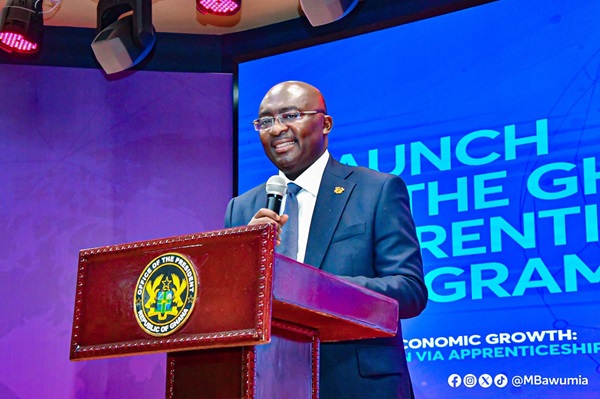
Ghana Apprenticeship Programme launched: 50,000 To receive job skills
A comprehensive apprenticeship programme to provide competency-based training to about 50,000 individuals has been launched in Accra.
The primary goal of the Ghana Apprenticeship Programme (GAP) initiative is to be the overarching programme providing apprenticeship training tailored to the demands of contemporary jobs and fostering a bridge between traditional apprenticeship systems and modern employment requirements.
It is being implemented by the Ministry of Education through the Commission for Technical and Vocational Education and Training (CTVET), with a budget of GH¢800 million, comprising $40 million from the World Bank and €20 million from the German Development Bank (KfW).
The launch was on the theme: "Fostering Economic Growth: Job Creation via Apprenticeship Training". It was chosen to reflect the strong correlation between small businesses and their role in fuelling economic growth.
Beneficiaries
The beneficiaries will include unemployed and underemployed individuals seeking skills and jobs, high school graduates, university graduates and persons who have completed their national service but want to be reskilled.
Other beneficiaries are master craft persons, their apprentices and workers, cooperatives and trade associations; private enterprises and workforces as well as private and public training providers.
The Vice-President, Dr Mahamudu Bawumia, who launched the GAP yesterday, said the programme would play a pivotal role in modernising apprenticeship systems by introducing formalised training providers, standardised curricula and a robust quality assurance framework.
He said it would facilitate a shift from conventional methods to a competency-based approach, ensuring that apprentices were equipped not only with theoretical knowledge, but also with practical and industry-relevant skills.
Since 2017, he said, the government had a clear plan to industrialise and one of the key pillars of that agenda was to revamp and modernise technical and vocational education and training (TVET) for it to become responsive to the needs of industry and to make it attractive to the youth.
To that effect, Dr Bawumia said an apprenticeship policy was launched in 2021 as part of a five-year TVET strategic plan (2018-2022).
“We have also, in collaboration with KfW, implemented fully TVET Voucher Project 2018 to 2023 leading to some 19,062 mastercraft persons and apprentices benefiting from this free apprenticeship training offered by government,” he stated.
In response to the critical need for enhancing skills development and addressing unemployment challenges in Ghana, the Vice-President added that the GAP, among others, emerged as a transformative initiative which ensured adequate and sustainable funding arrangement for apprenticeship practice.
Key among the activities of the programmes was the development of eligibility criteria, training of mastercraft persons and apprentices, assessment and certification of learners and linkage to job and trade.
Additionally, Dr Bawumia said the GAP had established voucher values which would continually be reviewed and adapted to the current economic needs of the private sector and training institutions, thereby bolstering the apprenticeship landscape in the country.
Vice-President Bawumia said one of the difficulties the government inherited in the TVET space was poor perception in the country.
As a result, he said, the government introduced “MyTVET campaign” which used tools such as WorldSkills Ghana Skills competitions, TVET Expos, TVET career guidance and counselling, Women in TVET conferences, establishment of TVET clubs in junior high schools and the use of role models and ambassadors to promote and make TVET-related careers aspirational for the youth.
TVET enrolment
He announced that 60,481 new students had enrolled this academic year in various government TVET institutions which provided free TVET compared to the less than 20,000 students who enrolled annually prior to 2017.
Dr Bawumia added that since the government took office in 2017, “we have invested over GH¢600 million in TVET.”
The investments covered the upgrading and modernising of all the 34 National Vocational Training Institutes (NVTIs), the TVET Service Head Office, together with 10 regional offices, the Vice-President explained.
"Five apprenticeship offices across the country and the Opportunity Industrialisation Centre in Accra, comprising the construction, rehabilitation and equipping of laboratories, workshops, additional classrooms, hostels and administrative offices which were also supported with €123 million, were completed in July 2022," Vice-President Bawumia stated.
The Board Chairman of CTVET, Nana Wereko-Ampim Opoku, said Ghana was caught in a low-skilled equilibrium in which employers had low expectation and settled for low-skilled workers.
He, therefore, expressed delight in the huge investment made in TVET and said it was important because currently, there was a shortage of high-semi-specialised skilled labour and an excess supply of low-skilled labour.
Nana Opoku added that apprenticeship, as a tool in the development of the capacity of the youth for socio-economic development, had been heavily under-utilised even though legal and regulatory frameworks existed to support its practice.
Appreciation
The Director-General of CTVET, Dr Fred Kyei Asamoah, for his part, expressed appreciation to all stakeholders for supporting CTVET, which, he said, was a true demonstration of their dedication to the training of Ghana’s workforce for modern jobs.
Dr Asamoah said persisting challenges relating to youth unemployment called for interventions to provide sustainable opportunities for the youth in the context of the evolving needs and aspirations of the nation.
He said GAP would help improve effective collaboration among employers, training providers and the informal sector.
Dr Asamoah said the programme would also enhance coordination mechanisms and the regulatory and institutional frameworks required for effective apprenticeship practice in Ghana while ensuring adequate and sustainable funding arrangement for apprenticeship practice.
The CTVET Director-General expressed the hope that GAP would ensure that TVET was lifted to its rightful place in the country.
